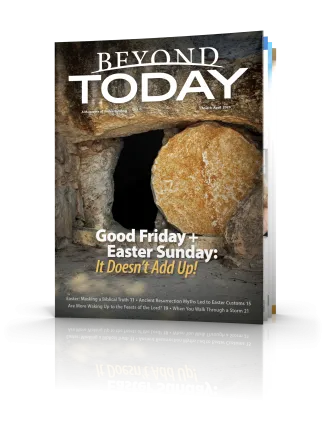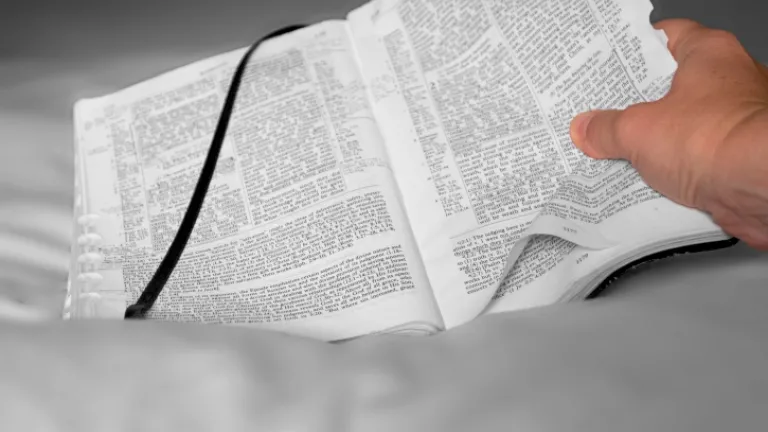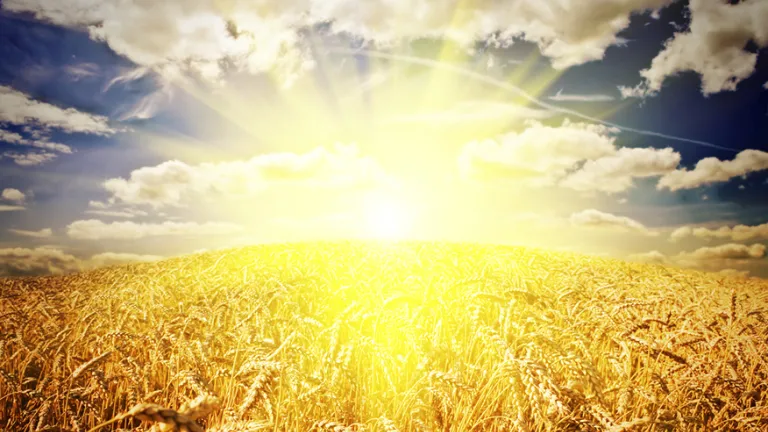What Does the Feast of Unleavened Bread Mean for Christians?

Central to our understanding of the biblical Feast of Unleavened Bread is the realization that the resurrected Jesus Christ lives His life in every individual Christian.
Growing numbers of Christians around the world are discovering and celebrating the biblical festivals outlined in Leviticus 23. By looking at the symbolism associated with these days, they are coming to view them in light of the life and mission of Jesus Christ.
After all, Jesus Christ Himself commenced the acting out of the plan of salvation by becoming our sacrificial Passover lamb. As the apostle Paul wrote in 1 Corinthians 5:7, “For indeed Christ, our Passover, was sacrificed for us” (compare Isaiah 53:7-9; 1 Peter 1:18-19). Furthermore, Jesus started His Church on another of these festivals, the Feast of Pentecost (Acts 2). He must have considered them important.
During the spring of the year (March-April in the northern hemisphere), immediately after Passover and weeks before the Feast of Pentecost, falls another biblical feast—the seven-day Feast of Unleavened Bread (Leviticus 23:6-8; Exodus 12:17-18). Here we’ll take a brief look at the greatest event to have ever taken place during this feast—and what it means for Christians today.
The greatest among several great events
Some might say that the Exodus from the slavery of Egypt, which also took place immediately after Passover during the Feast of Unleavened Bread (Numbers 33:3), was the greatest event to have ever happened during this spring festival.
Others might view the crossing of the Red Sea, which is traditionally assigned to the last day of Unleavened Bread, as another of the great festival events. This crossing signified that Israel was, at long last, finally free from Egyptian domination. Freedom was then a reality. Later, after Israel entered the Promised Land, the miraculous conquest of Jericho apparently took place over the seven days of this same feast.
Other great Unleavened Bread events involved rededicating of the people of God to their Creator. Two examples are recorded in 2 Chronicles. Chapters 29 through 31 describe the return to godly worship led by King Hezekiah, and chapters 34 and 35 tell of another under King Josiah. These chapters reveal the tremendous excitement and joy God’s people felt as they recommitted themselves to Him (2 Chronicles 30:21-23; 35:17-18).
But one other event that took place during the Days of Unleavened Bread is much greater in its ultimate impact than any of these wonderful events. That event is the resurrection of Jesus Christ!
We know that Jesus was crucified on the day before a Sabbath, as John 19:31 tells us. While most people assume that the Sabbath mentioned here was the regular weekly Sabbath day (observed Friday sunset to Saturday sunset), John plainly tells us that this particular Sabbath “was a high day”—a term used for the seven annual Holy Days that were part of God’s festivals.
A careful reading of the Gospels shows that this “high day” was the first day of the Feast of Unleavened Bread, a Holy Day (Leviticus 23:2, 6-7) that can fall on a weekday.
Jesus remained in the grave for three days and three nights, just as He had promised (Matthew 12:40). It is impossible to reconcile Jesus’ statement in Matthew 12 with the idea of a Friday afternoon crucifixion followed by a Sunday morning resurrection.
Three days and three nights from the time of His entombment, just before the beginning of the first Holy Day of Unleavened Bread, brings us to near sunset ending the weekly Sabbath, still during the seven-day Feast of Unleavened Bread, as the time when Jesus was resurrected.
In actuality there was no Sunday morning resurrection. It happened the afternoon before. But on that Sunday it was made known, and word spread quickly that the tomb was empty and that He had appeared first to Mary Magdalene (John 20:11-18) and then to other followers.
The greatest event in human history
Now, if we were followers of Jesus in Jerusalem at the time of His crucifixion and then were told that He had been resurrected, what would be the topic of our conversation for the rest of the spring festival? What would be in your thoughts? Undoubtedly we would all be thinking about the greatest event to have ever taken place in the history of humanity, the very statement of the angel: “He is risen!” (Matthew 28:6-7).
These Days of Unleavened Bread marked a turning point in the way the spring festival was to be celebrated down through the ages. Yes, Christians would still recall the Exodus, the coming out of Egypt, as a type of redemption from sin and release from the bondage of Satan. There would still be an emphasis on eating unleavened bread as a physical reminder that we are to become spiritually unleavened by removing sin from our lives.
But at the very center of it all—at the very core of the meaning of the Feast of Unleavened Bread—is the all-encompassing truth that the resurrected Jesus Christ, the One who was raised during this spring festival, now lives His life in every individual Christian!
Jesus repeatedly emphasized the importance of His own resurrection. During the last supper, He told the disciples that He would soon be betrayed, but He also told them that He would live again: “Because I live, you will live also” (John 14:19). He had just promised them that Christians would not be left as orphans (verse 18)—that is, spiritually unprotected and totally vulnerable to the power of Satan.
He stated that both the Father and He would live in the hearts and minds of Christians by the indwelling of the Holy Spirit (verses 20-26). Since the resurrected Jesus Christ now lives in us, we are given the strength to conquer our sins. This new life, now made possible by the living Christ, empowers us to overcome “the sin which so easily ensnares us” (Hebrews 12:1).
Symbolism of unleavened bread
Part of God’s instruction for the Days of Unleavened Bread is to put leavened bread products out of our homes (Exodus 12:15-16). The apostle Paul, in 1 Corinthians 5:8, encouraged the mostly gentile church there to “keep the feast, not with old leaven, nor with the leaven of malice and wickedness [lingering sinful attitudes], but with the unleavened bread of sincerity and truth”—a clear reference to the Feast of Unleavened Bread (emphasis added).
Paul recognized that the unleavened bread of this feast is symbolic of sincerity and truth, which should be hallmarks of the life of every Christian. He also understood that leaven during this time symbolized sin, and this feast pictures our need to make every effort to eliminate it completely from our lives.
The truly great story about the Days of Unleavened Bread is the story of the resurrected Christ living His life in those of us who have truly repented of living in sin and have received God’s Holy Spirit! This empowers us to overcome sins in a way that previously was simply not possible.
Yes, the Feast of Unleavened Bread is a festival that helps us to focus on replacing sin with righteousness. But the only real way to put sin out of our lives is to put Jesus Christ into our lives! We are promised that we can truly put sin out of our lives because Jesus Christ lives within us (compare Galatians 2:20; Romans 7:23–8:4).
What it takes to overcome sin
Paul tells us in Romans 13:12 that we are to “put aside the deeds of darkness and put on the armor of light” (New International Version). He then lists the “deeds of darkness” as sins such as revelry, drunkenness, lewdness, lust, strife and envy. Then in verse 14 he shows the way to conquer such sins—by being clothed “with the Lord Jesus Christ” (NIV).
In our struggles against sin, not only during the Days of Unleavened Bread but throughout the entirety of our lives, we can choose to fight on our own strength or we can surrender our will to God and rely on the risen Christ who lives His life in us through the power of the Holy Spirit. With this kind of power working against our sins, the very “power of His resurrection” (Philippians 3:10), we can say with Paul, “I can do all things through Christ who strengthens me” (Philippians 4:13).
We can struggle all alone, or we can rely on the power of the only One who never once sinned, Jesus Christ. He tells each of us as sinners, “Come to Me, all you who labor and are heavy laden, and I will give you rest” (Matthew 11:28). He encourages us to place our yokes and burdens on His powerful shoulders to find spiritual rest, saying, “My yoke is easy and My burden is light” (verses 29-30).
He promises that His faithful followers will never perish, nor will anyone be able to take them from His hand, because it is He who gives eternal life (John 10:27-28). We follow His instructions by coming to Him so that we may have life (John 5:40).
Jesus Christ lives again in us
Yes, Paul reminded Christians to “work out your own salvation with fear and trembling” (Philippians 2:12). Yet he was in no way preaching a works-based salvation, for in the next verse he explains that “it is God who works in you both to will [that is, to have the desire to overcome] and to do [to act on that desire] for His good pleasure” (verse 13).
Embedded in the meaning of the Days of Unleavened Bread is the belief that central to coming out of sin is the realization that the resurrected Jesus Christ lives His life in each one of us.
Indeed, as Paul also said, “If Christ is not risen, your faith is futile; you are still in your sins!” (1 Corinthians 15:17). And he further stated, “I am crucified with Christ: nevertheless I live; yet not I, but Christ liveth in me: and the life which I now live in the flesh I live by the faith of the Son of God, who loved me, and gave himself for me” (Galatians 2:20, King James Version).
It is the resurrection of Christ, and His living again in Christians to empower them to remove the leaven of sin from their lives, that gives these spring festivals—the Passover, the Festival of Unleavened Bread and Pentecost—such a deep and lasting meaning. Isn’t it time you looked more deeply into the meaning of these biblical festivals and what they teach us about the life and mission of Jesus Christ?






